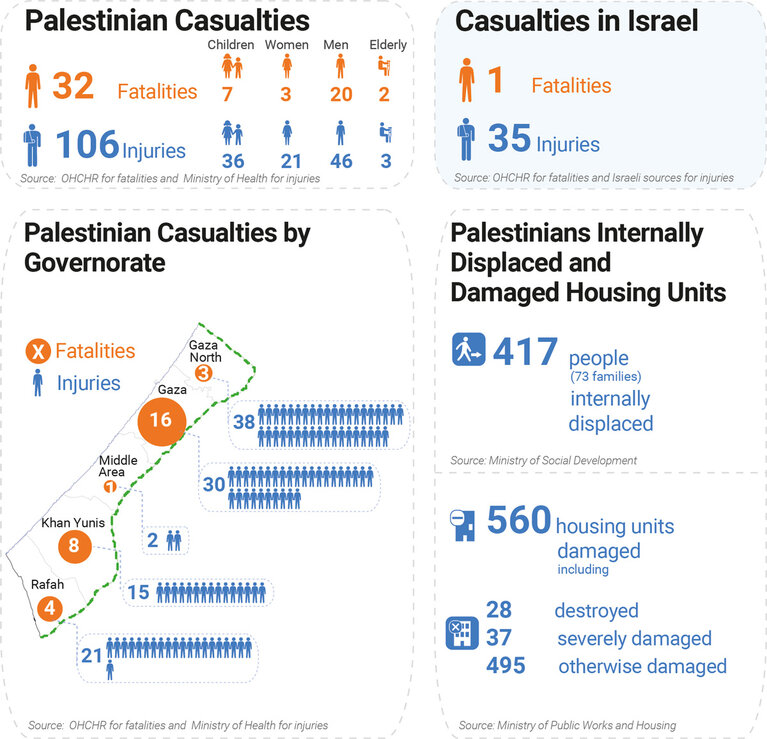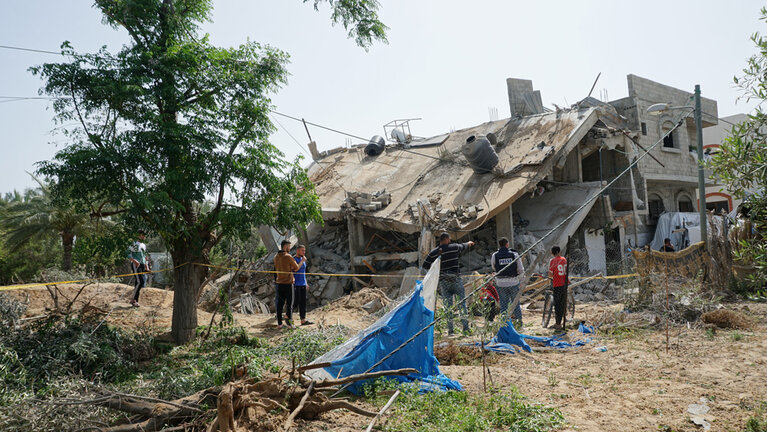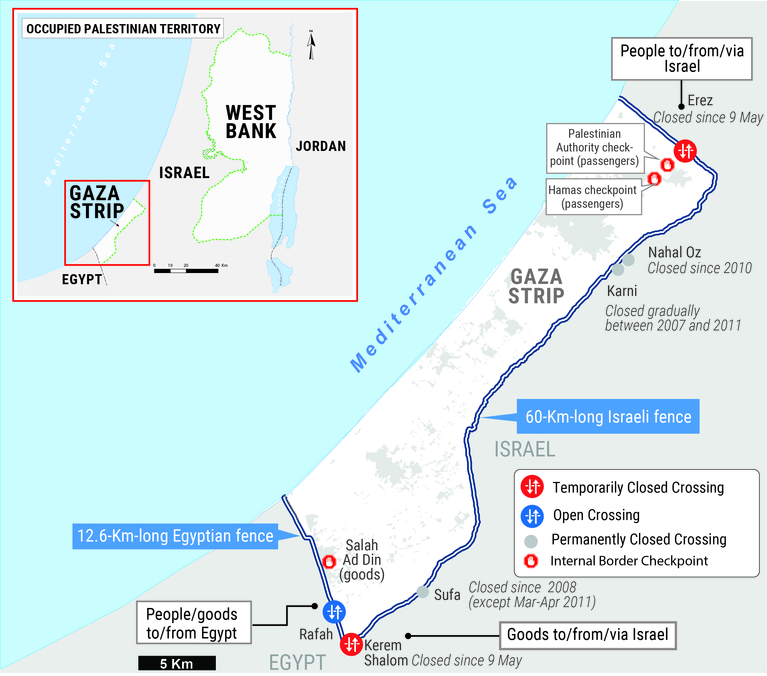Escalation of hostilities between Israeli forces and Palestinian armed groups in Gaza | Flash Update #3 as of 17:00, 12 May 2023
KEY POINTS
-
Armed hostilities between Israeli forces and Palestinian armed groups in Gaza Strip continued for the fourth consecutive day, resulting in further casualties and damage
-
Up to 17:00 on 12 May, the UN Human Rights Office (OHCHR) had verified 32 Palestinian fatalities, including at least 13 civilians, five members of armed groups, and 14 whose status is yet to be confirmed. Among the thirteen civilians were four girls, three boys, four women and two men. Up to 17:00 on 12 May, according to the Ministry of Health (MoH) in Gaza, 106 Palestinians were injured, including 36 children and 21 women.
-
Up to 17:00 on 12 May, the UN Human Rights Office (OHCHR) had verified one Israeli woman fatality. Magen David Adom and hospitals in Israel reported at least 35 people received medical treatment for physical injuries, alongside people who were treated for shock.
-
Referring to the deteriorating humanitarian situation in Gaza, the United Nations Relief and Works Agency for Palestine Refugees (UNRWA) decried the loss of life among civilians in the Gaza Strip and stated that “the current escalation in hostilities exacerbates an already severe humanitarian situation for Palestine Refugees in the Gaza Strip, among them many women and children.”
SITUATION OVERVIEW
On 11 May at about 17:00, the Israeli military conducted airstrikes on a residential building in Khan Younis, killing a member of the Palestinian Islamic Jihad (PIJ). Injuries and severe damage to nearby houses were reported.
On 11 May throughout the evening and night, Israeli forces launched air strikes on multiple locations across the Gaza Strip, reportedly targeting armed groups and related infrastructure, including a location near the Gaza Power Plant, to the north of the refugee camp of Nuseirat, causing a power outage for several hours in the area. Four Palestinians were killed among other injuries and damage to infrastructure reported.
On 11 May at about 17:00 and throughout the evening, armed groups in Gaza fired hundreds of rockets and mortar shells toward Israel. One Israeli woman was killed and several buildings and livelihood structures in the cities of Rehovot and Sderot, among other locations, were damaged. One of the damaged properties reportedly served as a support center for victims of sexual assault and harassment.
On 12 May at 8:00, a Palestinian man died of wounds he sustained the day before in an Israeli airstrike on the northern Gaza Strip, bringing the total number of Palestinian fatalities in that incident to three.
On 12 May, Israeli forces conducted airstrikes on a number of targets in the Gaza strip. Rocket fire from Gaza to Israel continued, with Israeli sirens reportedly going off in southern and central Israel and, for the first time during this escalation, in part of the West Bank, near Jerusalem.
Additional casualties were reported after this reporting period and will be covered in the next report
HUMANITARIAN OVERVIEW
- Israeli forces continued to launch strikes on multiple locations, including inhabited residential buildings, across the Gaza Strip, reportedly targeting armed groups and related infrastructure. Palestinian armed groups continued the firing of rockets on Israel. The escalation over the past four days has resulted in casualties and destruction of property, worsening the humanitarian situation in Gaza.
- Israeli airstrikes and shelling have hit houses and apartment buildings. In some of these properties, residents report receiving warning calls from members of Israeli forces. The hostilities have also led to internal displacement. A total of 73 families, comprising 417 people, have been internally displaced, mostly due to the destruction of their homes. Out of the internally displaced persons (IDPs), 27 people are staying in an UNRWA school in Beit Lahiya. The UNRWA designated emergency centers in the Gaza Strip are not activated yet.
- Extensive damage is reported to residential and commercial buildings, schools and infrastructure, including roads, the electricity network, water installations and agricultural land. Since the start of the escalation on 9 May, the Ministry of Public Works and Housing in Gaza reports that 560 housing units have been damaged, including 28 that were destroyed, 37 that were severely damaged and rendered uninhabitable, and others that sustained less damage.
- For the fourth consecutive day, both Israeli-controlled crossings, Erez (for people) and Kerem Shalom (for goods), were closed. The closure has prevented the exit and entry of hundreds of people, including patients and workers, among them aid workers. It has also prevented the entry of vital items such as food, medical supplies and fuel, at a volume of over 300 truckloads per day. Consequently, the available fuel for the operation of the Gaza Power Plant is being depleted, forcing a reduction in electricity production. As a result, and also due to the damages to local networks, the power supply has been reduced to less 12 hours per day in many places throughout Gaza, seriously undermining the provision of services, including health and water, sanitation and hygiene (WASH). All gas stations are operating normally, and fuel for domestic use is available.
- Both the Rafah crossing with Egypt and the adjacent Salah Ad Din gate were open for the movement of people and goods during the escalation but were closed for the weekend on 12 May.
- According to local authorities, 3,616 people have exited from Gaza and 2,111 people have returned to Gaza through Rafah crossing during the week.
- Water, hygiene and sanitation (WASH) infrastructure has also been affected, including two water wells in Beit Hanoun and Khan Younis, which sustained minor damages, reducing the wells’ operating hours and productivity.According to the Israeli military (as of 14:30 on 12 May), Israeli forces have targeted 215 objectives in Gaza since the beginning of the Israeli-announced operation “Shield and Arrow” on 9 May. Also, according to the military, Palestinian armed groups fired 860 rockets and projectiles towards Israel throughout the escalation, of which 440 crossed into Israel and the rest fell short and landed within Gaza or at sea. The UN verifies the cause of all fatalities, including those from airstrikes, rocket fire or rockets falling short.
Protection
Priority Needs
- Availability of transportation and safe access for IDPs in rural areas.
- Risk of death and injury posed by explosive ordnance or bombing. Potential risk of explosive remnants of war (ERW) contamination.
- Increased need for mental health and psychosocial support (MHPSS), as information from hotlines (receiving a high number of calls) suggests that many people reportedly experience psychosocial distress, fear, anxiety, insecurity, panic attacks, and trauma especially among children and women.
- Child protection needs are expected to include expanded, structured and specialized child protection, including case management, and MHPSS aimed at supporting vulnerable children and families who have been affected.
- Increase recreational stockpiles for children and caregivers.
- GBV partner hotlines are receiving a high number of calls from persons seeking information on how to help children who suffer from fear and panic, how to evacuate women and girls with disabilities and the closest shelter to them in case of evacuation.
- Information from hotlines suggests many women are experiencing depression while continuing to perform all required household duties.
- Resources are needed to allow hotlines to continue to work for more than 8 hours (09:00-17:00) during the escalation.
- There is a need for increased dignity-kit stockpiles to allow for their provision to girls and women (for those displaced or residing in damaged structures).
Response to Date
- Protection Cluster has updated contingency contact lists and placed key partners on alert.
- There are 27 protection partners who have currently indicated that they will be active during the emergency and will provide a combination of remote and in-person services across protection response in Gaza.
- Protection Cluster is continuing to closely monitor the situation, with the ongoing monitoring and documenting of possible violations of international humanitarian law and international human rights law, and civilian fatalities.
- The United Nations Mine Action Service (UNMAS) has initiated an emergency mass media campaign through various platforms, including social media and radio stations, to send Explosive Ordnance Risk Education (EORE) and Conflict Preparedness and Protection (CPP) messages to as wide a population as possible. EORE and CPP digital content have also been widely shared with MA group partners, Protection Cluster, OCHA and other UN partners to share via their networks and platforms.
- UNMAS is supporting UNRWA to assess risks at schools that have been damaged during the escalation.
- The Child Protection Area of Responsibility continues to assess the impact of the situation on vulnerable groups, especially children.
- Child Protection partners have activated remote hotline services to provide counselling and PSS. Counselling contacts have been announced, including via social media.
- The Ministry of Social Development (MoSD) in Gaza has activated the Child Protection networks (these are in 5 governorates led by MoSD and include 9 counsellors to provide community support).
- The GBV Sub-Cluster is conducting outreach to shelters to check their emergency plans, any urgent needs and to put them on alert.
- Most GBV partners have activated their contingency plans and are operating hotlines for protection services.
- GBV partners continue to provide services for GBV survivors including remote and in-person PSS, advanced MHPSS, counselling, emergency childcare counseling, remote visitation services and supporting high risk cases in need of sheltering services.
Key Constraints and Gaps
- Limited supplies of non-food items (NFIs), including number of available dignity kits (1,081).
- Limited access to basic emergency information (ambulances, police and civil defense).
- Closure of offices of service providers due to security concerns; Safety risks and hazards disrupting the capacity of emergency responders to mobilize.
- Lack of infrastructure to provide remote GBV protection services.
Shelter
Priority Needs
- According to the Ministry of Public Works and Housing (MoPWH), 65 housing units sustained significant damage, including 28 that were destroyed and 37 that were severely damaged, becoming unhabitable. In addition, 495 housing units were otherwise damaged.
- Overall, 73 families, compromising 417 people, who had their homes destroyed or damaged since 9 May or left their homes due to protection concerns, have been internally displaced. Most are staying with host families, except four families (27 people) who took shelter at an UNRWA school. UNRWA Designated Emergency Centers in the Gaza Strip are not activated yet.
- The IDPs are considered most in need of humanitarian assistance.
Response to Date
- Shelter implementing partners are providing NFIs to internally displaced families. 17 families have been reached as of 11 May, and provision of NFIs to the other families is ongoing.
Key Constraints and Gaps
- Movement restrictions are preventing partners from reaching affected people and are impeding humanitarian assistance.
- Inability to assess the damage to the affected houses is limiting the ability of shelter partners to respond to needs.
- There is a lack of funding to provide urgent support for Transitional Shelter Cash Assistance (TSCA) for IDPs or urgent repair of damaged shelters.
Health
Priority Needs
- A ceasefire and a situation in which women and girls can feel safe enough to leave their homes and seek healthcare is urgently needed.
- There is a need to address the shortage of chronic medical supplies.
- The reopening of the Beit Hanoun/Erez Crossing is needed to enable patients to access lifesaving interventions outside of Gaza.
Response to Date
- Partners have released prepositioned medical supplies worth about $US400,000 to support the MoH in the management of the injured and are also conducting local procurement for items that were not prepositioned.
- All health facilities are open and working with some reduced hours and with a focus on essential and emergency services.
- Partners have been providing telephone counseling services.
- Some partners have committed $US730,000 to cover some of the drugs and disposables that are chronically in shortage.
Key Constraints and Gaps
- If the situation persists or escalates there will be a need for additional resources to support the emergency response.
- Support is needed to address the chronic drugs and disposables shortages.
Food Security
Priority Needs
- Farmers face poor and unsafe access to their lands, and less irrigation and harvesting will reduce the quality and quantity of fresh vegetables and major losses for farmers.
- Financial losses due to the stop in trade and exit/export from Gaza to West Bank and Israel is resulting in an estimated daily loss of $US560,000 for farmers in Gaza.
- Closure of crossings with Israel has led to less import of hatching eggs and less availability of white meat in the market.
- The high demand and little supply for food commodities will likely lead to an increase in food prices.
- Animal fodder is available for another nine to eleven days if closures remain effective. The decrease of fodder capacity and stockpile for breeders is becoming alarming.
- The vulnerability of daily workers in farming, livestock and poultry sectors are increasing.
- Fishing at sea has been prohibited by the local authorities for four consecutive days, affecting more than 4,400 fishermen and their families’ who rely on fishing as their only source of income.
- Fishermen are missing the current season of fishing sardines which creates increased vulnerability and debt dependency.
- According to the Ministry of Agriculture (MoA), the fishing sector in Gaza is estimated to be losing $US120,000 per day.
- WFP food supply trucks are on hold due to the crossing's closure, putting food security in danger.
Response to Date
- 1,000 food parcels were provided to vulnerable households in Khan Yunis.
- WFP has begun monitoring and tracking food prices and stocks across its network of local shops in Gaza. So far, prices and availability have remained stable, with a few exceptions. The prices of eggs have slightly increased and there is a risk of shortage of dairy products due to their short shelf life. The price of wheat flour has slightly decreased.
- Ninety-two per cent of people receiving WFP's e-voucher food assistance had redeemed in the first week of May. Redemption of food assistance during the escalation has not been interrupted, 7000 families have redeemed food items from shops in the last 3 days. The top redeemed item is wheat flour.
- WFP is ready to distribute emergency rations of canned tuna and fresh bread to IDPs in UNRWA shelters, as per the Joint Emergency Food Assistance protocol, in case of activation. The agreement with 21 local bakeries has been finalized.
Key Constraints and Gaps
- Poor or no access to land and animal farms will cause severe losses for farmers.
- There is unavailability of food and proteins, and if available it is of less quality and higher price, affecting all people in Gaza.
- The closed crossings and fishing restrictions are generating daily losses.
- The lack of WFP funds for food assistance remains a constraint.
Education
Priority Needs
- All education facilities have been closed for four consecutive days, affecting over 600,000 students. At least six of the Palestinian children killed during the escalation were students.
- Increased need for MHPSS.
Response to Date
- As long as the schools are closed and the contingency plan is not activated, education response will be focused on remote MHPSS provided by partners.
- When schools are reopened the following responses will be prioritized:
- Provision of remedial education program and catch-up classes.
- Provision of school-based PSS and recreational activities.
- Emergency rehabilitation for damaged schools, if any.
WASH
Priority Needs
- Two water wells in Beit Hanon and Khan Younis sustained minor damage, reducing the wells' operating hours and productivity.
- There is a lack of water chemicals for the desalination plants. The available stocks will cover the plants operation for one week.
- The depletion of fuel reserves at the Gaza Power Plant (GPP) may affect the power supply for more than 600 WASH facilities in the Gaza Strip.
Response to Date
- WASH Cluster partners provided Costal Municipal Water Utility (CMWU) and the water service providers with around 70,000 litres of Chlorine for water disinfection.
- UNICEF is coordinating the provision of 50,000 litres of fuel for the emergency operation of 120 critical WASH facilities in the Gaza Strip to compensate for the shortage of power supply.
Key Constraints and Gaps
- Restrictions on importing the required fuel for the GPP would affect the power supply and thus the operation of the WASH facilities, including 120 critical water and sanitation facilities.
- The shortage of the chemicals required for the operation of the water desalination plants would affect the provision of desalinated water for more than 375,000 persons in Gaza.
Protection against sexual abuse and exploitation (PSEA) remains a cross-cutting priority for all clusters. SAWA helpline 121 and WhatsApp number 00 972 59-4040121 (East Jerusalem 1-800-500-121) operates 24/7. This toll-free number is disseminated across all areas of interventions to report cases of SEA and facilitate emergency counseling and referrals of affected communities to life saving services. The PSEA Network is monitoring calls daily and will reinforce the number of counselors if necessary.












